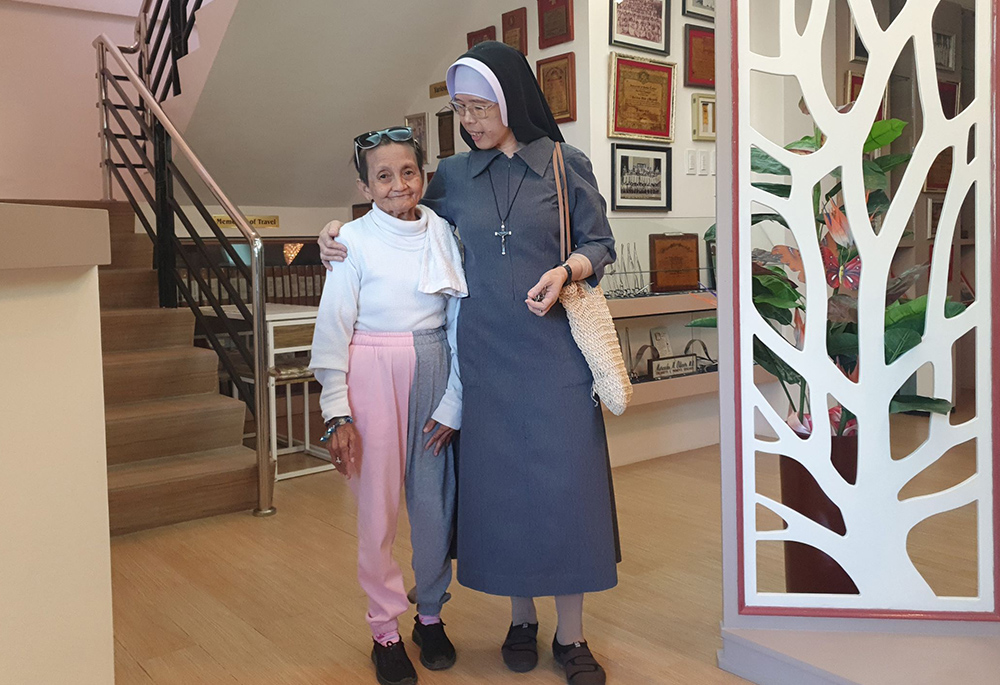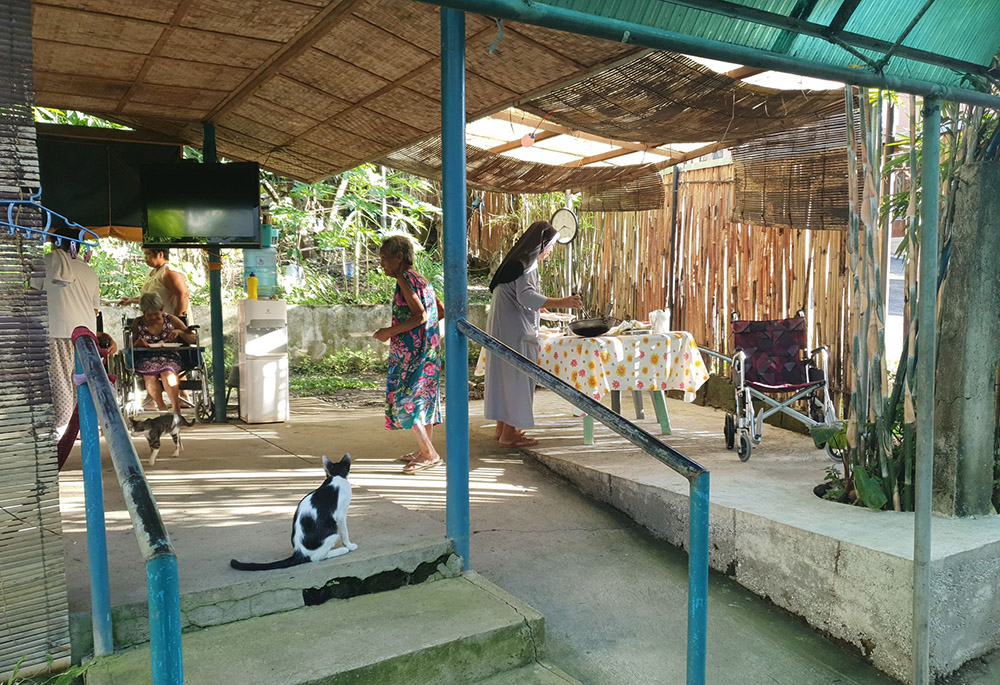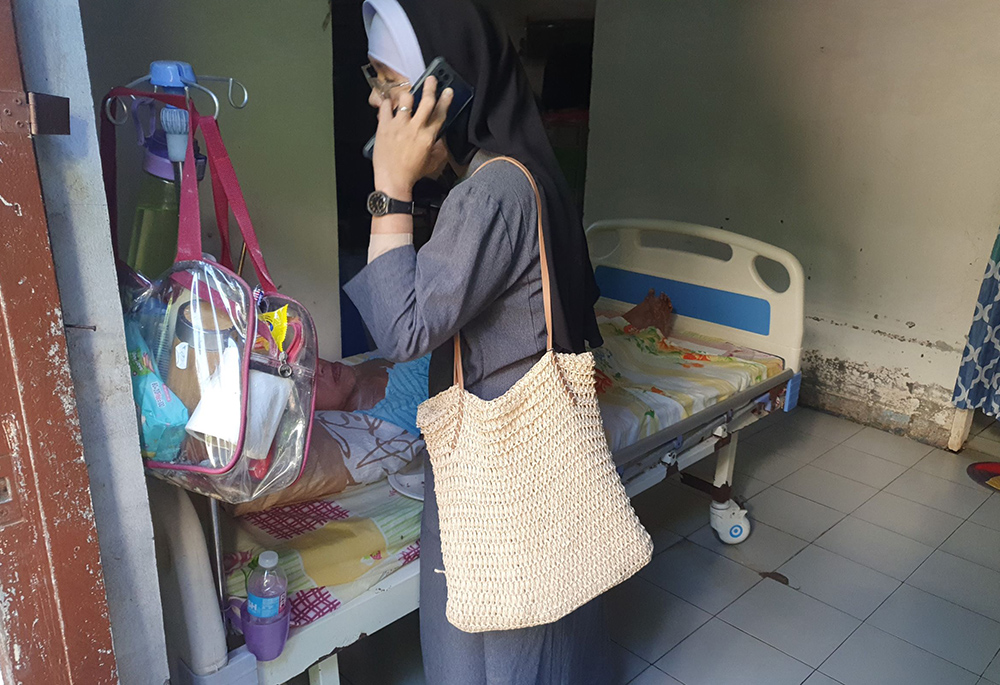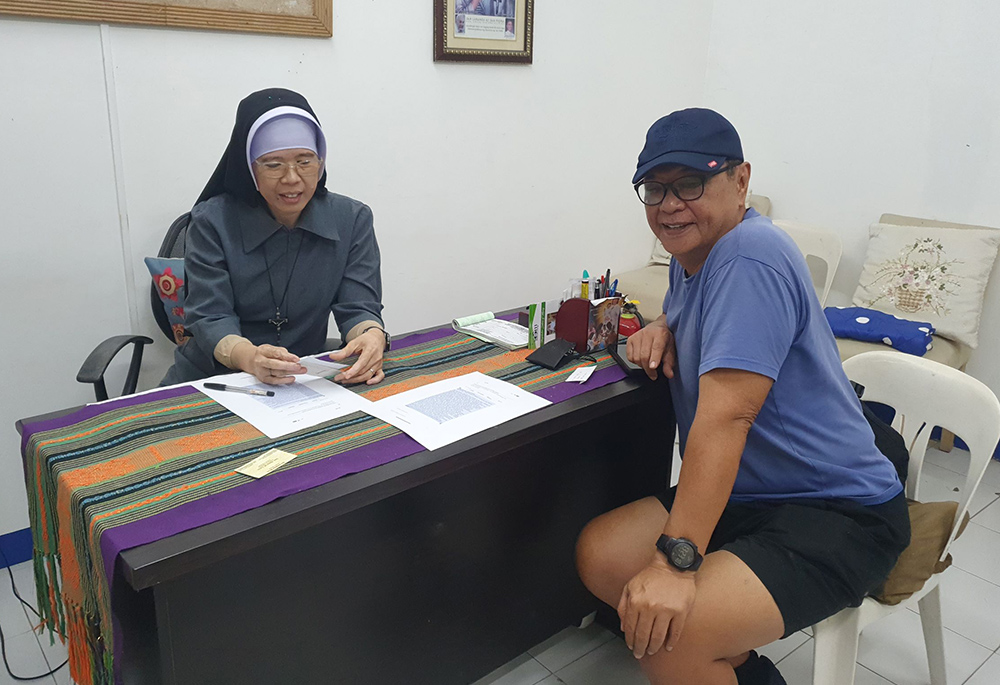
Residents of Mary Mother of Mercy Home for the Elderly and Abandoned in San Pedro, Laguna, Philippines, gather in the home's outdoor hut to recite the Divine Mercy prayer and the rosary. They also watch TV there. (Oliver Samson)
Four Sisters of St. Francis Xavier look after 18 residents of a home for older women who need care in San Pedro, a city south of Manila, the country's capital.
The congregation has only two Filipina members today, both of whom work at Mary Mother of Mercy Home for the Elderly and Abandoned with two sisters from Myanmar. Since 2002, the home has provided shelter to women between the ages of 60 and 90, regardless of religious affiliation, who are experiencing homelessness.
In Myanmar, where the Sisters of St. Francis Xavier was founded in 1897, there are 400 sisters and 114 communities, said Sr. Venus Marie S. Pegar, a Filipina and vocation director of their small community in the Philippines.
When the St. Francis Xavier sisters took over the Mary Mother of Mercy Home for the Elderly and Abandoned from the Servites, who had been caring for older men there, in 2002, the congregation had only one Filipina member, and three sisters from Myanmar flew in to help. When another Filipina joined the congregation, the third sister returned to Myanmar.

Eulalia Ocon, a resident at the Mary Mother of Mercy Home for the Elderly and Abandoned, with Sr. Venus Marie S. Pegar, vocation director of the Sisters of St. Francis Xavier's community in the Philippines, at the home's museum. Ocon, who has speech disability, helps the nuns give guests tours of the museum, which was built by Mercedes Oliver, a philanthropist. (Oliver Samson)
The Myanmar sisters can speak only a little English and Filipino, Pegar said, and both nuns communicate better in English. But the language barrier does not hamper their ability to efficiently carry out their apostolate.
"Our superior had been assigned here before," said Sr. Jay Ann dela Cruz, another Filipina and youngest among the four. "So she already knows basic Filipino."
Sister Rose Susie, a Myanmar native, is the superior of the congregation's community in the Philippines. The other Myanmar native is Sister Roselyn.
When the situation requires more than basic Filipino, the Filipina sisters turn up to handle it, said dela Cruz, who is currently studying psychology.

Sister Rose Susie, the Sisters of St. Francis Xavier's community superior, serves a snack to Mary Mother of Mercy Home for the Elderly and Abandoned residents in the home's hut after the Divine Mercy prayer and the rosary. The residents watch TV before and after the prayers at 3 p.m. (Oliver Samson)
The Myanmar sisters prepare their native food for the Filipino residents, like sticky rice cakes with ripe bananas, she added. The Filipino sticky rice cakes have no banana.
"The lolas find the rice cakes tastier for its banana," dela Cruz said.
"Lola" means "grandmother" in Filipino, and the sisters use the term endearingly with the women in their care.
The nuns serve the residents breakfast, usually bread and coffee, at 6:30 a.m. After breakfast, they do some stretches in an open hut. At times, the nuns play music to motivate them to dance.
"We encourage them to take a brief walk outside," Pegar said. "But some lolas quickly complain that they are already tired even after just a few steps. The others really refuse to move."

Two residents of Mary Mother of Mercy Home for the Elderly and Abandoned spend afternoon time outside on the second floor of their home. (Oliver Samson)
The sisters previously encouraged the women to do some light activities to keep them active, like rug-making, but they started to complain of painful hands and poor eyesight. Instead, the sisters mounted a TV in the hut to provide some entertainment.
At 3 p.m. daily, the residents recite the Divine Mercy prayer and the rosary. After the prayers, they take their afternoon snack. The sisters spoon-feed two residents.
The sisters rotate cooking duties weekly and fill in for dela Cruz when she has a class.
"We encourage the sisters who are studying to prioritize their classes," Pegar said.
The sisters also wash the residents' clothes daily, she added.
The residents also do their part. They wash dishes after meals, and some do their own laundry.
"Some of the lolas love doing something," she said.
Advertisement
Virginia David, 67, who moved to Mary Mother of Mercy Home for the Elderly and Abandoned three years ago, washes dishes and does her own laundry.
"The sisters are kind to us," said David, who uses a walker. "I'm very thankful to them for giving us shelter, food and care."
When one of the women is sick, the sisters look closely after her, especially in the evening, dela Cruz said. A physician also checks on the conditions of the residents, she added. And if one of the women dies, Pegar said, she is buried after a funeral blessing.
Women from an economically poor community near the Mary Mother of Mercy Home for the Elderly and Abandoned who receive food from the nuns help them bathe the residents.
It started when a woman came over to ask for some rice, Pegar said. Grateful and happy to return the favor, the woman volunteered to help the sisters bathe the residents. Other women in that community followed suit. Today, there are four women from the community who help the nuns bathe the residents, including those who are bedridden or use wheelchairs.

Sr. Venus Marie S. Pegar, vocation director of the Sisters of St. Francis Xavier's community in the Philippines, checks on a bedridden resident of Mary Mother of Mercy Home for the Elderly and Abandoned. (Oliver Samson)
"While we pray in the morning, they bathe the lolas," Pegar said. "Even when we tell them to wait for us, they will start bathing them. So when we are finished with the prayer, they usually are done."
The residents of Mary Mother of Mercy Home for the Elderly and Abandoned have not run out of food in the past 20 years. But in 2020, during the height of the COVID-19 pandemic, when the government locked down communities and enforced tight controls over the movements of people, the residents nearly went hungry for the first time.
"We ran out of rice, [adult] diapers, coffee and other basic provisions," Pegar said. "Our generous benefactors couldn't personally visit us due to the government restrictions. And everyone was scared. They had no idea of our situation here. So, we contacted them and let them know what was happening."
Everyone was also hoarding goods in their homes in anticipation of possible months of lockdown.
Provisions arrived soon after the sisters made contact with the outside world, sparing the residents.
When the government control over the movement of people started to loosen, charity for women began to flow in again, until it reached the point where it threatened to overflow.

Sr. Venus Marie S. Pegar, vocation director of the Sisters of St. Francis Xavier's community in the Philippines, meets with Ramon Torres, a retired pilot, on a fundraising initiative by his granddaughter and her high school classmates for the abandoned women. (Oliver Samson)
Heaving with supplies that could sustain the residence for several months, the sisters advised their benefactors to ship or bring goods months later, after they used up the provisions they had.
Ramon Torres, a retired pilot, said he visited the residence for the first time on his birthday in 2015. He brought food, beddings, towels, adult diapers, and water.
He visited the residents for the second time in 2018 with his granddaughter, Mika, who was in elementary school at the time. Torres recently stopped by San Pedro to inform the sisters that Mika, now in high school, and her classmates were raising some money for the abandoned women.
Torres saw the women's need to meet people from the outside because they are otherwise confined in their residence.
"When they see people, they interact," he said. "When they see people who care for them, you can see their smiles."





